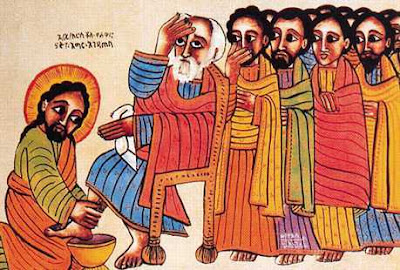Having loved his own who were in the world, he loved them to
the end.
There are two feasts of the Blessed Sacrament in
the liturgical year both of which fall on a Thursday.Corpus Christi, even if it is now usually
celebrated on the following Sunday, is formally on the Thursday after Trinity
Sunday. Corpus Christi with Benediction and procession is primarily a
celebration of the real presence of Christ in the Sacrament: This is my Body. But Maundy Thursday, ‘on the night before he
was betrayed’ is primarily a celebration of the Eucharistic Sacrifice: given for you. One would not want to
exaggerate of course. Both Corpus Christi and Maundy Thursday put before the
whole of the great mystery of the Eucharist: This is my Body given for you. But the readings for Maundy Thursday
make it clear that we cannot understand the least bit of this unfathomable
mystery, ‘the source and summit of the Church’s life,’ unless we see it as a Sacrifice,
the same Sacrifice of Good Friday, something which on the whole is more
difficult for us than Real Presence.
The first reading describes the Old Testament
prefiguration of the Lord's Supper, the eating of the Passover lamb, while the
second reading, taken from Paul's letters, describes the New Testament
fulfillment of that prefiguration. The Gospel of the foot-washing, not
obviously related to the Eucharist, reveals to us Jesus' inner attitude at his
self-giving to Church and world. This dramatic action opened the disciples'
eyes to perceive what really did happen in the institution of the Eucharist and
what really happens in each Eucharist celebrated since.
Every detail of this mysterious report of
the Passover meal was to be revealed by the Christian celebration with a view toward
the fulfillment of the Passover meal. First, an "unblemished, male, young
(year-old) lamb" was required as a sacrifice: only the best is good
enough, it can carry no blemish. Then, the meal must be eaten
"hastily" while dressed for the road. In a Christian sense this can
only mean eating while prepared to depart from the mortal world to God, eating
while prepared to pass through the wilderness of death into the promised land with God, rather
than eating in comfort and carefree expectation of continuing the status quo
into an earthly future. The Christian Lamb is, after all, the Risen One who takes us up into a "life
hidden with Christ in God" into a sharing of his Resurrection. Finally,
the Lamb's blood is to be smeared on our doorposts so that God's judgment might
pass over us. Only Christ's blood, if it is discovered on us, can save us from the just judgment, for he has passed through the judging of sins and as Savior
has become our Judge.
Paul reports what "was delivered" to
him: Jesus' prayer of thanksgiving over the bread: "This is my body given for
you. Do this in remembrance of me." Likewise with the cup, which "is
the New Covenant in my blood". To this Paul adds: each Eucharistic meal is
a "proclamation of the death of the Lord". The Old Testament ceremony now receives its final profound
meaning: "This is my Body given for you, a covenant in blood" speaks
of a sacrifice of extreme love, extreme to the point that the One sacrificing himself
becomes food and drink for those to whom he gives himself. Not only that, but
it also means transferring authority over this sacrifice to the recipient: "Do
this", not merely "receive this". The same thing will recur on
Easter when the Risen One will say: "Those whose sins you forgive",
instead of simply saying: "Receive forgiveness from me and my
Father." What already pushes our imagination to the limit-that the God-man
gives himself as food for eternal life to us, his murderers-is now to be
surpassed: we are to carry out ourselves what has been done for us, we are to
present the Son's sacrifice to the Father.
The Gospel may seem far removed from all this
but in one of the modern Eucharistic Prayers a portion of this Gospel is added
to the words of institution: for when the
hour had come for him to be glorified by you, Father most holy, having loved
his own who were in the world, he loved them to the end. The foot-washing is
an act of love that Peter understandably perceives as completely unacceptable,
as turning the world upside down. So it does because this inversion is the most
upright thing possible. One must first let it happen to himself, precisely as the
Lord did it in his incomparable love's humbling-before he can take it as
"an example" for himself and
practice this self-abasement with the brethren. This is the Gospel's tangible
demonstration of the subsequent passage's description of the mystery of the
Eucharist: Christians should, like Christ himself, become edible food and
potable drink for each other.
Every time a priest and people gather to “do
this” all of this happens. The Church, the Body of Christ is formed by the Body
and Blood of Christ; the one perfect sufficient sacrifice of the Son is
presented again to the Father; the world is turned upside down by Love; we are
loved until the end and are compelled again to love by the Love which feeds us
and washes us.
Having loved his own who were in the world, he loved them to
the end.
I am indebted as always to Fr. von Balthasar.


No comments:
Post a Comment